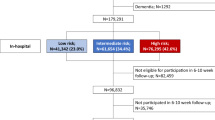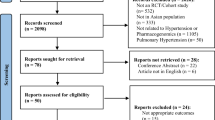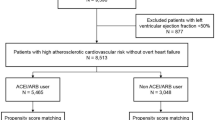Abstract
Angiotensinogen is an essential component of the renin-angiotensin system. ACE-inhibitors and β-blockers both have a direct influence on this system. To investigate whether the association between use of ACE-inhibitors or β-blockers and the risk of myocardial infarction (MI) or stroke is modified by the T-allele of the angiotensinogen M235T polymorphism. In this study, 4097 subjects with hypertension , aged 55 years and older, were included from the Rotterdam Study, a population-based prospective cohort study in the Netherlands, from July 1, 1991 onwards. Follow-up ended at the diagnosis date of MI, stroke, death, or the end of the study period (January 1, 2002). The drug–gene interaction on the risk of MI or stroke was determined with a Cox proportional hazard model with adjustments for each drug class as time-dependent covariates. The risk of MI was increased in current use of ACE-inhibitors with the MT or TT genotype compared to ACE-inhibitors with the MM genotype (Synergy Index (SI): 4.00; 95% CI: 1.32–12.11). A significant drug–gene interaction was not found on the risk of stroke (SI: 1.83; 95% CI: 0.95–3.54) in ACE-inhibitor users or between current use of β-blockers and the AGT M235T polymorphism on the risk of MI or stroke. ACE-inhibitor users with at least one copy of the 235T-allele of the AGT gene might have an increased risk of MI and stroke.
Similar content being viewed by others
Log in or create a free account to read this content
Gain free access to this article, as well as selected content from this journal and more on nature.com
or
References
Brown MJ, Haydock S : Pathoaetiology, epidemiology and diagnosis of hypertension. Drugs 2000; 59 (Suppl 2): 1–12.
Neal B, MacMahon S, Chapman N : Effects of ACE inhibitors, calcium antagonists, and other blood-pressure-lowering drugs: results of prospectively designed overviews of randomised trials. Blood Pressure Lowering Treatment Trialists' Collaboration. Lancet 2000; 356: 1955–1964.
Jeunemaitre X, Soubrier F, Kotelevtsev YV et al: Molecular basis of human hypertension: role of angiotensinogen. Cell 1992; 71: 169–180.
Inoue I, Nakajima T, Williams CS et al: A nucleotide substitution in the promoter of human angiotensinogen is associated with essential hypertension and affects basal transcription in vitro. J Clin Invest 1997; 99: 1786–1797.
Schunkert H, Hense HW, Gimenez-Roqueplo AP et al: The angiotensinogen T235 variant and the use of antihypertensive drugs in a population-based cohort. Hypertension 1997; 29: 628–633.
Sethi AA, Nordestgaard BG, Tybjaerg-Hansen A : Angiotensinogen gene polymorphism, plasma angiotensinogen, and risk of hypertension and ischemic heart disease: a meta-analysis. Arterioscler Thromb Vasc Biol 2003; 23: 1269–1275.
Kunz R, Kreutz R, Beige J, Distler A, Sharma AM : Association between the angiotensinogen 235T-variant and essential hypertension in whites: a systematic review and methodological appraisal. Hypertension 1997; 30: 1331–1337.
Sethi AA, Tybjaerg-Hansen A, Gronholdt ML, Steffensen R, Schnohr P, Nordestgaard BG : Angiotensinogen mutations and risk for ischemic heart disease, myocardial infarction, and ischemic cerebrovascular disease. Six case–control studies from the Copenhagen City Heart Study. Ann Intern Med 2001; 134: 941–954.
Bis JC, Smith NL, Psaty BM et al: Angiotensinogen Met235Thr polymorphism, angiotensin-converting enzyme inhibitor therapy, and the risk of nonfatal stroke or myocardial infarction in hypertensive patients. Am J Hypertens 2003; 16: 1011–1017.
Hofman A, Grobbee DE, de Jong PT, van den Ouweland FA : Determinants of disease and disability in the elderly: the Rotterdam Elderly Study. Eur J Epidemiol 1991; 7: 403–422.
World Health organization: International Classification of Diseases, 10th Revision (ICD-10). Geneva: WHO Switzerland: World Health Organization, 1992.
Hollander M, Bots ML, Del Sol AI et al: Carotid plaques increase the risk of stroke and subtypes of cerebral infarction in asymptomatic elderly: the Rotterdam study. Circulation 2002; 105: 2872–2877.
Anonymous: Guidelines for ATC classification and DDD assignment, 3rd edn, Oslo: WHO collaberating Centre for drug statistics Methodology, 2000.
van Duijn CM, de Knijff P, Cruts M et al: Apolipoprotein E4 allele in a population-based study of early-onset Alzheimer's disease. Nat Genet 1994; 7: 74–78.
Khoury MJ, Flanders WD : Nontraditional epidemiological approaches in the analysis of gene–environment interaction: case–control studies with no controls!. Am J Epidemiol 1996; 144: 207–213.
Hingorani AD, Jia H, Stevens PA, Hopper R, Dickerson JE, Brown MJ : Renin-angiotensin system gene polymorphisms influence blood pressure and the response to angiotensin converting enzyme inhibition. J Hypertens 1995; 13: 1602–1609.
Dudley C, Keavney B, Casadei B, Conway J, Bird R, Ratcliffe P : Prediction of patient responses to antihypertensive drugs using genetic polymorphisms: investigation of renin-angiotensin system genes. J Hypertens 1996; 14: 259–262.
Kurland L, Melhus H, Karlsson J et al: Angiotensin converting enzyme gene polymorphism predicts blood pressure response to angiotensin II receptor type 1 antagonist treatment in hypertensive patients. J Hypertens 2001; 19: 1783–1787.
Danser AH, Derkx FH, Hense HW, Jeunemaitre X, Riegger GA, Schunkert H : Angiotensinogen (M235T) and angiotensin-converting enzyme (I/D) polymorphisms in association with plasma renin and prorenin levels. J Hypertens 1998; 16: 1879–1883.
Hopkins PN, Lifton RP, Hollenberg NK et al: Blunted renal vascular response to angiotensin II is associated with a common variant of the angiotensinogen gene and obesity. J Hypertens 1996; 14: 199–207.
Acknowledgements
The Netherlands Heart Foundation financially supported this study, Grant number: 2001.064 The Rotterdam Study is supported by the Erasmus Medical Center and Erasmus University Rotterdam, the Netherlands Organization for Scientific Research (NWO), the Netherlands Organization for Health Research and Development (ZonMw), the Research Institute for Diseases in the Elderly (RIDE), the Ministry of Education, Culture and Science, the Ministry of Health, Welfare and Sports, the European Commission (DG XII), the Municipality of Rotterdam, and the Centre for Medical Systems Biology (CMSB). The contributions of the general practitioners and pharmacists of the Ommoord district to the Rotterdam Study are greatly acknowledged.
Author information
Authors and Affiliations
Corresponding author
Rights and permissions
About this article
Cite this article
Schelleman, H., Klungel, O., Witteman, J. et al. Angiotensinogen M235T polymorphism and the risk of myocardial infarction and stroke among hypertensive patients on ACE-inhibitors or β-blockers. Eur J Hum Genet 15, 478–484 (2007). https://doi.org/10.1038/sj.ejhg.5201789
Received:
Revised:
Accepted:
Published:
Issue date:
DOI: https://doi.org/10.1038/sj.ejhg.5201789
Keywords
This article is cited by
-
Pharmacogenetics of Thiazide Diuretics: An Update on Inter-individual Variations
Springer Science Reviews (2016)
-
Expanding Role of Pharmacogenomics in the Management of Cardiovascular Disorders
American Journal of Cardiovascular Drugs (2013)
-
Pharmacogenetic Advances in Cardiovascular Medicine: Relevance to Personalized Medicine
Current Genetic Medicine Reports (2013)
-
The Rotterdam Study: 2012 objectives and design update
European Journal of Epidemiology (2011)
-
The Rotterdam Study: 2010 objectives and design update
European Journal of Epidemiology (2009)



